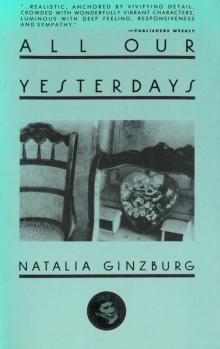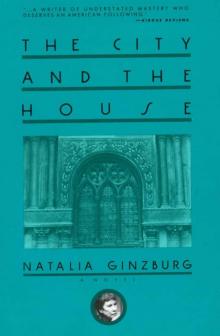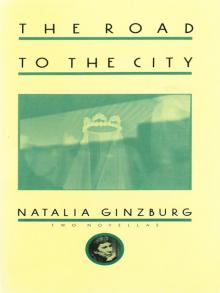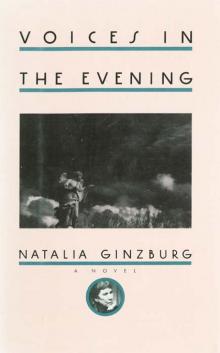- Home
- Natalia Ginzburg
The Little Virtues Page 3
The Little Virtues Read online
Page 3
The suburbs of London, where the streets of little identical houses go on and on in a way that makes you feel dizzy, are also extremely gloomy.
Here in London the sight of some shop-windows filled to overflowing with shoes that all have the same pointed toes and stiletto heels makes me feel equally dizzy. Or windows brimming over with women’s underclothes—so stuffed with merchandise that my eyes feel sated with it and any desire to buy a slip or a pair of stockings is completely destroyed. To see such abundance gives me the impression that I don’t need anything at all, and I feel a revulsion against stockings and slips that seems as though it will last for ever.
The small new leaves are a tender green on the trees and stand out like delicate embroidery against the redbrick walls of the little houses.
From time to time on the street you find yourself in front of a beautiful tree covered in tender pink or brilliant white blossom, a gracious adornment to the street. But as you look at it you realize that it is there according to some precise plan and not by chance. And the fact that it is not there by chance but according to a precise plan makes its beauty seem sad.
In Italy a tree in blossom at the roadside would be a delightful surprise. It would be there by chance, having sprung. out of the earth in sheer joy, and not because a calculated decision had been made that it should be there.
In London, which is a black and grey city, man has placed a few colours with precision and forethought. You can suddenly find a blue or red or pink front door among its black brothers. The buses that pass by in the grey air are painted a vivid red. These are colours that would be cheerful anywhere else, but here they are not cheerful; set in place in such an exact and deliberate way they are like the weak, sad smile of someone who doesn’t know how to smile.
And the fire-engines, which do not have a strident siren but a sweetly ringing bell, are also red.
England is never vulgar. It is conventional, but not vulgar. Because it is sad it is never coarse. Vulgarity springs from coarseness and bullying. It also springs from fantasy and imagination.
Sometimes we think we notice vulgarity, in the strident voice or shrill laugh of a woman, in the violent colours of her make-up or in her straw-coloured hair. But we quickly realize that in this country vulgarity is always overpowered by melancholy.
The English have no imagination. They all dress in the same way. The women you see in the streets all have the same beige or transparent plastic raincoats which look like shower-curtains or tablecloths in restaurants. They all carry wicker shopping-baskets looped over one arm. The business men all wear the uniform we know—black bowler-hat, pinstripe trousers and umbrella. The artists who live in Chelsea and the students who dream about art and a dissipated, bohemian life have untidy red beards and check jackets with shapeless pockets. The girls of this type dress in skin-tight black trousers, high-necked sweaters and—in the rain—white shoes.
When they dress like this the young believe that they are proclaiming at the tops of their voices their unconventionality, originality, freedom, and the individual inspiration of their own thoughts. Yet it does not occur to them that the streets are full of thousands of young people exactly identical to themselves, with the same hairstyle, the same expression of naïve defiance, the same shoes.
The English have no imagination: and· yet they do show imagination in two things—two only. In the evening-clothes worn by old ladies, and in their cafés.
In the evenings the ladies wear the most extraordinary clothes. And they lavishly paint their faces pink and yellow. They transform themselves from mousy little sparrows into peacocks and resplendant pheasants.
No one is surprised by them. But the English do not know what surprise is. No one ever turns his head to look at anyone else in the street.
England also expresses its sense of fantasy in its cafés and restaurants. They often give them foreign names to make them more attractive—‘Pustza,’ ‘Chez Nous,’ ‘Roma,’ ‘Le Alpi.’ When you look through the windows you see wispy climbing plants, Chinese lanterns, sharp peaks of rock, the blue of glaciers. Or you see skulls and cross-bones, black walls, black carpets, funereal candles—and because these places are often deserted a mournful silence reigns.
Because England is so dissatisfied with itself it tries to dress up in the borrowed feathers of a foreign glamour, or seeks out the frisson of funereal enticements.
However, the food and drink which you find in these Pustza, Alpi and sepulchres all has the same wretched taste. Imagination has not yet reached as far as the food and drink—it is still tangled up in the curtains, carpets and lanterns.
The English rarely show surprise. If it happens that someone faints in the street, everything is provided for. In a few seconds a chair is found for him, a glass of water, a uniformed nurse.
That people may faint in the street has been foreseen, and everything goes on around the patient automatically and promptly so that help is at hand.
But the English are profoundly astonished when we ask for a little water in a restaurant. They do not drink water, and always quench their thirst with endless cups of tea. They never taste wine or touch water. And so a request for a glass of water—that glass of water which arrives so promptly when someone faints in the street—disconcerts them. They bring it at last—a small glass containing a little tepid water, on a tray, with a teaspoon.
Perhaps they are right to camouflage their cafés and restaurants under foreign disguises, because when these places are unequivocally English such a squalid desperation reigns in them as to make anyone who enters think of suicide.
I have often wondered why there is such a feeling of desolation in English cafés. Perhaps it comes from their desolate social relationships. Every place where the English gather to chat to one another exudes melancholy. Indeed, nothing in the world is sadder than an English conversation, in which everyone is careful to keep to superficialities and never touch on anything essential. In order not to offend your neighbour, not to violate his privacy— which is sacred—an English conversation revolves around subjects that are extremely boring for everyone concerned, but in which there is no danger.
The English are a people completely without cynicism. Basically, beneath their guffaws of laughter which suddenly burst out and then seem to shatter dully without any echo, they are always serious. They still believe in certain values which have been forgotten everywhere else—in the seriousness of work, of study, of fidelity to oneself, to friends, to one’s word.
Civilization, respect for one’s fellow men, good government, the capacity to perceive and to provide for men’s needs, help for the old and the sick—all this is certainly the fruit of an ancient and profound intelligence. But this intelligence is not at all visible or noticeable in the people you pass in the street. If you look round yourself you see no trace of it. If we pick someone out at random and talk to the first person who passes us in the street it is useless to expect words that indicate human intelligence.
When we go into a shop the assistant greets us with the words ‘Can I help you?’ But these are mere words. She immediately shows that she is quite incapable of helping us and is not at all interested in trying to. There is no flicker in her of any desire to come to an agreement with us or cooperate with us, of any wish to satisfy us. When she looks for what we want she does not extend her gaze two centimetres beyond the end of her nose.
English shop assistants are the stupidest shop assistants in the world.
But it is a stupidity in which there is no cynicism, insolence, bullying or contempt. It is a stupidity entirely lacking in vulgarity. It is never under any circumstances demeaning, and so it is not offensive. The assistants’ eyes have the empty stunned stillness of the eyes of sheep on a limitless moor.
When we leave the shop the stunned empty eyes of the assistant follow us without having made any judgement about us or even considered us. They are eyes which forget us immediately, as soon as we have left their tiny field of vision.
A
nd so if we happen to come across an assistant who is less stupid than the rest we feel ready to buy the whole shop out of sheer astonishment.
Italy is a country which is willing to submit itself to the worst governments. It is, as we know, a country ruled by disorder, cynicism, incompetence and confusion. Nevertheless we are aware of intelligence circulating in the streets like a vivid bloodstream.
This is an intelligence which is clearly useless. It is not used to benefit any institution that might to some extent improve the human condition. All the same, it warms and consoles the heart, even if this is an illusory comfort and perhaps a foolish one.
In England intelligence is translated into deeds, but if we look for it among the people who pass us in the street we only find a faint glimmer and this—stupidly and unjustly certainly—gives us a feeling of loss and induces melancholy.
We are quickly infected by the English melancholy. It is a sheepish, stunned melancholy, a sort of empty bewilderment, and on its surface the conversations about the weather, the seasons—about all those things one can discuss without going too deeply into anything, without giving offence or being offended—linger like the constant quiet buzzing of mosquitoes.
However, the English seem to be somehow aware of their sadness and of the sadness which their country inspires in foreigners. When they are with foreigners they have an apologetic air and appear always anxious to get away. They live as if in eternal exile, dreaming of other skies.
I am always surprised that in Italy those who have adolescent children dream of nothing but sending them to England during the summer holidays. Particularly if they have children who, as often happens during adolescence, are going through a period of being shy, unsociable, sulky and sullen. Italian parents think of England as a cure for just such ailments. In fact, England has no effect at all. It is a country where people stay exactly as they are.
A timid person stays timid, an unsociable person stays unsociable. And over this initial timidity and unsociableness spreads the great, limitless English melancholy, like an endless moor in which the eyes can find no landmark.
Moreover, these parents vainly hope that their children will learn English during their summer visit—a language that is extremely difficult to learn, which very few foreigners know well, and which every Englishman speaks in his own way.
England is a country where people stay exactly as they are. The soul does not receive the slightest jolt. It stays always still, unchanging, protected by a gentle, temperate, humid climate without seasonal extremes, in the same way that the green of the fields (which it is impossible to imagine being greener) stays the same throughout the seasons, never eaten away by intense cold or devoured by the sun. The soul does not free itself from its vices but neither does it attach itself to new vices, Like the grass, the soul silently lulls itself in its green solitude, watered by the tepid rain.
There are very beautiful cathedrals. They are not hemmed in among houses and shops but set in the midst of green meadows. There are very beautiful cemeteries with simple tombstones here and there on the grass beside the cathedrals, where there is a profound peace. No walls enclose them; they exist in a perpetual intimacy with the life about them, but immersed in unsurpassable peace.
In the country of melancholy the mind always returns to death. It does not fear death because it sees the shadow of death as being like the vast shadow of the trees, and like the silence that is already present in the soul, lost in its green sleep.
La Maison Volpé
Near my house in London there is a place called La Maison Volpé. What it is I do not know, as I have never been inside it: I think it is a restaurant or café. Perhaps I shall never go inside, and that name will keep its aura of mystery for me. But I have a feeling that when I remember London and the time I have spent here those syllables will echo in my ear, and all London will be summed up for me in that Parisian name.
From the outside nothing is visible except a door with glass windows covered by thick dull brown curtains made of tulle; the curtains are old, dusty and faded. Perhaps it is a restaurant, but when I go past it I am not aware of any smell—either good or bad; and I have never seen anyone pass through the door over which its strange name —La Maison Volpé—is spelt out in black and gilt lettering. Whether it is a café or a restaurant or a dance-hall, I have the feeling that any food or drink served in there must be ancient, moth-eaten and covered in dust like the curtains. It is on a more or less suburban street; between a garage and a shop that sells refrigerators the always hermetically sealed Maison Volpé sends out its nocturnal mystery, a promise of secret, exotic and possibly sinful pleasures implied by the black and gilt lettering of its na me.
There are many places like La Maison Volpé in London; they appear in the most unexpected areas, they have extravagant names, and from the outside it is difficult to say what they are: they have a nocturnal, exotic, and vaguely sinful air to them and when you enter, during the day time, you find a mysterious twilight only slightly mitigated by the glow from a few little blue lamps: there are velvet carpets and walls painted black—but everything is made disappointingly ordinary by the sugar bowls on the tables, full of the brown cane sugar they use here. We quickly realize that absolutely nothing strange happens in these places, and the only thing to drink in them is weak tepid coffee eked out with milk. The people sitting at the tables have dressed with a certain care—you can see from their clothes that they have not dropped in by chance but that they have come intending to spend a few hours in this particular place, and, perhaps, to enjoy themselves. What enjoyment there might be in passing the time in a place so completely devoid of cheerfulness I do not know. You do not see lovers embracing one another, and the conversation is carried on in an educated undertone; the customers do not give the impression of being involved in the kind of intimate, passionate, lively conversations which occur between a man and a woman, or between friends, in our cafés. There is no kind of intimacy in that educated undertone. All the furnishings, the curtains, the carpets, the twilight atmosphere, seem to be there in order to suggest intimacy, but it remains an abstract proposition, a remote dream.
When Italians in London meet each other they talk about restaurants. In all London there is not one restaurant where it is pleasant to meet your friends, and chat and eat. The restaurants are either too crowded or too empty. And they are either stiff and priggish or squalid. Sometimes they manage to be equally both at once; sometimes the priggishness is more noticeable than the squalor—stiff chairs with high backs, ladies swathed in furs, silver decanters: sometimes it is the squalor which is the more noticeable and there is a kind of colourless neglect to the place; but wherever you are you eat more or less the same dishes, the same overdone steak with a little boiled tomato next to it, and a leaf of lettuce without either oil or salt.
There are restaurants that serve only roast chicken. Masses and masses of chickens turning on spits. The waiters dash from table to table carrying plates of chicken. No other kind of food is visible. We leave feeling so nauseated that it seems impossible—ever in our lives—to taste a piece of chicken again. There are also restaurants called ‘The Egg and I’. In them there is nothing but eggs—stone cold, marmoreal, hard-boiled eggs over which a little dribble of mayonnaise has been squirted.
Restaurants and food are widely advertised in England. In the cinema, in the street, in the underground stations, in magazines you see huge, colourful pictures of food and drink. ‘Oh, it is luxurious! It is delicious!’* At the cinema we see long advertisements for restaurants—Chinese, Indian, Spanish—with orchestras, palm trees, flowers, and customers who eat with a fez or a sombrero perched on their heads, who go into ecstasies in front of a plate on which we glimpse the usual overdone steak and solitary lettuce leaf. Images of ripening strawberries and endless pastures, which will become Kiaora ice-cream (which you can have ‘here and now’*) or paper cups of Fresko milk (‘Fresko is delicious! and full of vitamins’*)—follow each other on the screen. The ci
ty is full of invitations to eat and drink. On every corner you see a poster showing a boiled egg with the sensible suggestion ‘Go to work on an egg’*. Or ‘Drinka Pinta Milka Day’*. ‘Babycham? I’d love a Babycham!’* Or, ‘Have a chicken for your weekend’*.
But despite all this fuss which is made about food, for the English it remains simply ‘food’*, which is a sad, generalized thing. In novels you read that ‘some food’* was brought, no affectionate or specific description is given. The thousands of tins stacked up in the groceries carry pictures of the most various and mouthwatering animals—pheasants, partridges, different kinds of deer, and they are stamped with the enticing names of distant countries which it would be marvellous to visit. But anyone who has been here for some time is unimpressed, he knows very well that the contents of these tins are ‘food’*, which is to say nothing. Nothing that could be eaten with enjoyment and a quiet mind anyway.
After you have lived here for a while you realize that you have to be careful when buying food. You cannot go into a cake-shop, choose a few cakes and then take them home and eat them. This simple, innocent act is out of the question here. Because those cakes—so prettily covered in chocolate and dotted with almonds—are, when you eat them, like a paste made of coal-dust or sand. I should, out of fairness, add that they are perfectly harmless. They are only horrible, innocuous but horrible, with the staleness of hundreds of years, but innocuous. The cakes placed next to the mummies in the tombs of the Pharaohs must have the same taste. And you cannot buy sweets with an easy mind either. They can be as hard as rocks; they can stick to the teeth and fill your mouth with a peculiar taste of salt.
A pall of sadness hangs over every place where food is sold or served. Even the windows of the green-grocers—full of beautiful-looking fruit, piles of grapefruit and bunches of bananas—these green-grocers’ windows which are the same everywhere, in the stations of the underground, in the most distant suburbs and in the most remote rural villages, are always sad. Perhaps because they are so relentlessly identical to each other. Perhaps because we know that when this fruit is eaten it has no taste. But perhaps only because we are dealing with food, and that is something which is sad here.

 Happiness, as Such
Happiness, as Such The Dry Heart
The Dry Heart The Manzoni Family
The Manzoni Family A Place to Live
A Place to Live All Our Yesterdays
All Our Yesterdays The Little Virtues
The Little Virtues The City and the House
The City and the House The Road To The City
The Road To The City Voices In The Evening
Voices In The Evening